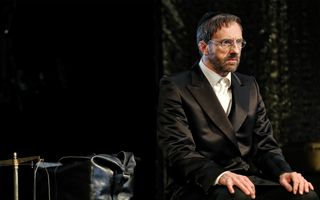 Watch
Watch
Fairytales
The plot of The Merchant of Venice is reminiscent of fairytales and folklore from history, namely the ‘princess in the tower’ and the ‘bond.’ The story surrounding Portia reflects the story of Rapunzel or Cinderella: a beautiful young woman trapped until she is rescued by a prince. The story of the bond is that of Antonio and Shylock. Shylock is determined to attain the pound of flesh even when he is offered twenty times the original loan.
The ‘pound of flesh’ existed in folktales a long time before the rise of anti-Semitism, and medieval audiences were particularly interested in this horrific idea and the superstitions that surrounded ritual murder.
The Three Caskets also appeared in folktales throughout history. The game is always the same, and the hero is always the one that makes the right choice. This is generally the most modest and humble choice, and the hero is then richly rewarded.
Fathers and Daughters
Complex father/daughter relationships are present in many of Shakespeare’s plays – A Midsummer Night’s Dream, Othello, Romeo and Juliet, for example. In all of these cases the daughter requires a man to free herself from the constraints of her father. This is certainly evident in The Merchant of Venice with the relationships of Shylock and Jessica, as well as Portia and her late father. However, Portia finds herself in a slightly different predicament since her father has passed away: she can’t escape his dying wishes no matter how much she wants to. Jessica is certainly living under the constraints of her father’s house, and she responds negatively to this, calling it a living “Hell.’”However, her behaviour before and after she escapes is somewhat questionable. She is frivolous and indulgent with money, she steals from her father, completely rejects Shylock, and states that she is “ashamed to be my father’s child!” (Act 2, Scene 2). She absolves herself of her religion without much thought and shows no mercy to her father at the end of the production, even though he has lost everything. We are left to wonder whether Elizabethan audiences would have condoned her behaviour, a possible reflection of the anti-Semitic sentiments of the 16th century.
Antonio is a father figure to his young male friends Bassanio, Gratiano and Lorenzo. Just as Portia and Jessica are leaving their fathers to start a life with their new husbands, the young men are leaving the father figure, Antonio, to start their new lives with their wives. Shakespeare addresses the issue of changing family relationships in this play, an issue as vital today as in the 1590s when he wrote The Merchant of Venice.
Mardi Gras and Hedonism
In Elizabethan London, conservative Puritans rejected Christian excess and rituals in much the same way that Shylock wishes to protect Jessica from the Venetian celebrations. The Merchant of Venice is set in the time of Mardi Gras, which was the time of partying and celebration before Lent. In the case of the young men in the play, it is their final celebration before marriage. There is a wildness in the air, also evident in the young men’s behaviour in the court.
There also seems to be a lack of responsibility that is aligned with this ‘Christian frivolity’. Bassanio is a man lacking the ability to support himself financially, and both Antonio and Portia bear the brunt of this. He does not let his financial means affect his lifestyle or goals, but this has consequences. Jessica yearns to be part of this hedonistic Christian world, but in order to do so, she steals from her hard-working father and leaves him while he is out of the house.
Money
Money is at the centre of all relationships in the play; money is lost, gained and sought after. The young men are linked to Antonio, the merchant, who has money. Bassanio asks Antonio for money so that he might seek to marry Portia, who has money. Portia has the wealth of her father’s estate which she must give over to the man who chooses the correct casket. She comes from a family of wealthy means, but has no control over her wealth. It is not until the revelation after the trial that Bassanio realises the depth of Portia’s love, aside from money. It is important to note that much of Bassanio’s language throughout the play focuses on commercial gain, rather than romance. His first line about Portia in the play is “In Belmont is a lady richly left” (Act 1, Scene 1). Nerissa works for Portia and so she enjoys the benefits of money through her employer, and is thus bound to her. Antonio is constantly competing with Shylock and this is based on money, although it does grow into a dispute of life, death and religion.
Antonio is essentially ‘new money’, a new aristocrat, and his status relies on the success and failure of his ventures. This status is therefore unstable, so he is constantly burdened by the fear of losing his newly gained fortune.
There is often much debate over the title of this play. Many academics believe the play should have been called The Jew of Venice, but suspect that Shakespeare wanted to differentiate his play from Marlowe’s The Jew of Malta. However, perhaps it is no mistake that the word ‘merchant’ is in the title as the play seems to revolve around the dissemination of money: who has it, who wants it, who loses, who gains. The characters who end the play surrounded by wealth are the happy ones. Modern productions have tended to focus heavily on the commercial elements of this play, often choosing a corporate setting. These productions often show that there is no difference between the money-lender or the merchant, that they are both interested in personal gain, and neither one has necessarily pure intentions, despite the play’s ending.
Relationships and Alliances
Relationships are a focal point of The Merchant of Venice. They are the result of certain events that occur or derive out of alliances: for instance, the bond, the caskets, and religion.
The Christian characters are portrayed as being a well-bonded group, almost family. The friendship of Antonio and the three young men has on occasion been considered to have homosexual undertones. Antonio gives money that he doesn’t have to Bassanio without a second thought and risks his life on his behalf. The generosity and friendship of these men is however undermined by their bigoted words and actions towards those not in their inner circle. Antonio shows an immense pride and superiority in his behaviour: he kicks and spits upon Shylock, curses him, and when confronted, is in no way remorseful. Even the Christian women show a dislike of non-Christians: Portia does not disguise her relief and joy when the Prince of Morocco fails to choose the correct casket. She says, “Let all of his complexion choose me so.” (Act 2, Scene 7)
The Christian characters are hypocritical when they expect Shylock to release Antonio from the bond. Shylock points out that Antonio has been bought by the bond and that contract should be respected like any other. Antonio’s Christian friends believe he should be treated differently and demand that Shylock relent, even though they show very little respect to Shylock’s requests. Shakespeare challenges the apparent virtue of the Christian characters through these interactions by exposing their hypocrisy.
Shylock is extremely isolated in this play and this increases as the events unfold. He does have one Jewish friend and ally, Tubal, but otherwise his daughter abandons him, as do his servants, and he is left at the end of the play completely downtrodden, broke, and alone. Most of the Christian men in the play outwardly show their disdain for him. He is denied relationships and inclusion, and the audience witness the devastating results of such segregation.
Self-Interest versus Love
Shakespeare highlights the different values of two religious groups: Christians and Jews. Through Shylock, Shakespeare appears to suggest that Jewish people value business and wealth over human relationships. He shows the Christians to value human relationships above wealth through the court scene and also through Antonio’s willingness to lend money that he doesn’t have. He lends this without interest, accepting Shylock’s bond, and later writes to Bassanio that he is willing to give up his life, “…all debts are cleared between you and I if I might but see you at my death” (Act 2, Scene 3).
Shylock, on the other hand, is quite focused on his money. He determines his house must be locked up on the Mardi Gras night, saying “There are my keys. Look to my house... I am right loath to go… For I did dream of money bags tonight’ (Act 2, Scene 5). When Jessica and his money are gone, he reportedly cries, “O, my ducats! O, my daughter!” (Act 2, Scene 8)
Shylock seems to be sentimental about the ring Jessica has sold, which belonged to his late wife. It is this moment and his insistence on the pound of flesh that challenges the notion that he is solely interested in money and wealth. Shylock’s determination to have the pound of flesh is a sign of his resentment of his treatment by Antonio and the Christians, as he is offered much more money than that which he loaned originally and refuses to accept it. In this instance, Shylock becomes consumed by revenge much more than money. He can’t see past it and this could be conceived as either self-interested or a logical psychological reaction due to years of abuse.
The Christians are also not without flaws and self-interest. Bassanio initially seeks out Portia as she has wealth, Antonio tells Bassanio that he lends him the money out of love, however Bassanio crudely points out that he will make money in pursuing Portia: “I have a mind presages me such thrift, / That I should questionless be fortunate” (Act 1, Scene 1).
The Divine Quality of Mercy
The apparent justice of the Christians in the courtroom renders Shylock a broken man. His estate is stripped from him and through Portia, Antonio demands he become a Christian. Although the Christian characters talk about mercy, love and charity, their application of this is selective. They expected Shylock to show mercy and Portia responds to Shylock with:
The quality of mercy is not strained,
It droppeth as the gentle rain from heaven
Upon the place beneath. It is twice blest:
It blesseth him that gives, and him that takes
That in the course of justice, none of us
Should see salvation. We do pray for mercy,
And that same prayer doth teach us all to render
The deeds of mercy.
Act 4, Scene 1
She explains the concept of mercy in explicably Christian terms and, as Penny Gay states, “Portia’s speech, noble though it is, ideologically excludes Shylock, and ultimately becomes merely an expression of the dominant discourse of the society”. Portia’s understanding of mercy is based on the way Christians in Shakespeare’s time understood the difference between the Old and New Testaments. According to the writings of St. Paul in the New Testament, the Old Testament depicts God as requiring strict adherence to rules and exacting harsh punishments for those who stray. The New Testament, in contrast, emphasises adherence to the spirit rather than the letter of the law, portraying a God who forgives rather than punishes and offers salvation to those followers who forgive others. Thus, when Portia warns Shylock against pursuing the law without regard for mercy, she is promoting what Elizabethan Christians would have seen as a pro-Christian, anti-Jewish agenda.
The strictures of Renaissance drama demanded that Shylock be a villain, and, as such, patently unable to show even a drop of compassion for his enemy. A sixteenth-century audience would not expect Shylock to exercise mercy — therefore, it is up to the Christians to do so. Once she has turned Shylock’s greatest weapon — the law — against him, Portia has the opportunity to give freely of the mercy for which she so eloquently advocates. Instead, she backs Shylock into a corner, where she strips him of his bond, his estate, and his dignity, forcing him to kneel and beg for mercy.
Given that Antonio decides not to seize Shylock’s goods as punishment for conspiring against him, we might consider Antonio to be merciful. However, we may also question whether it is merciful to return to Shylock half of his goods, only to take away his religion and his profession. By forcing Shylock to convert to Christianity, Antonio disables him from practicing usury (lending money at high rates of interest), which, according to Shylock’s reports, was Antonio’s primary reason for berating and spitting on him in public. Antonio’s compassion, then, seems to stem as much from self-interest as from concern for his fellow man. Mercy, as delivered in The Merchant of Venice, never manages to be as sweet, selfless, or full of grace as Portia presents it.





